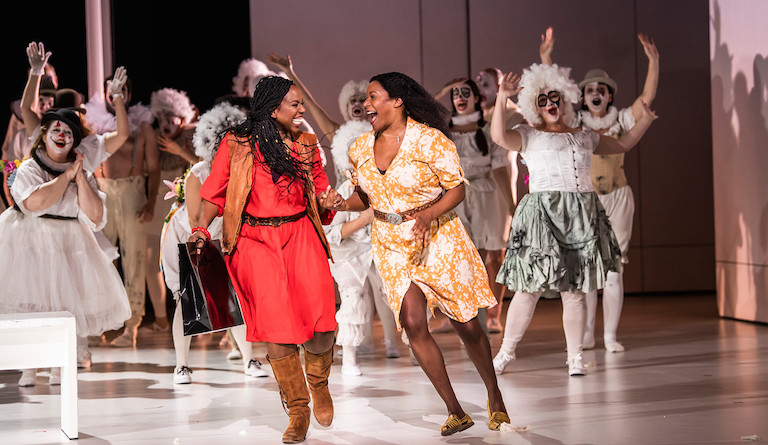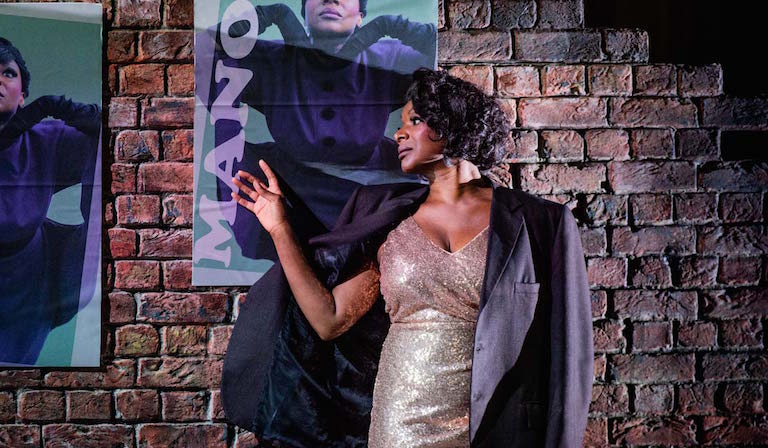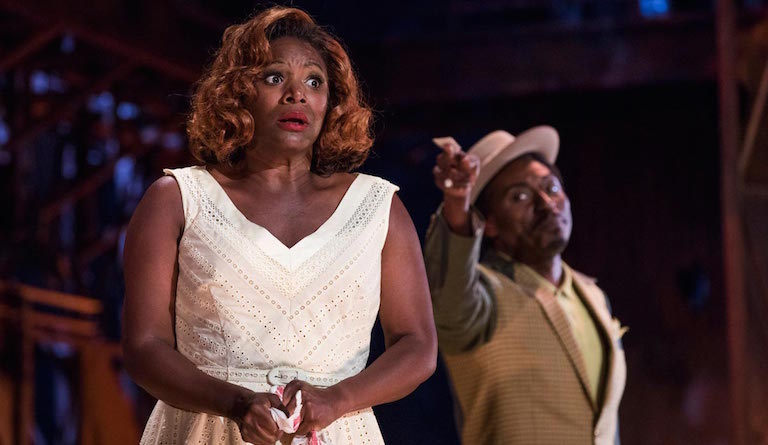Elizabeth Llewellyn interview: 'It's never a jolly jape!'
The soprano who has reached new heights talks about singing during lockdown, a commemorative performance, and improvising on stage
Elizabeth Llewellyn, soprano in Mozart's Requiem. Photo: Shirley Suarez
There are many pieces of music with the power to move an audience to tears, but maybe none is an overwhelming as Mozart’s Requiem, not only because it is achingly beautiful, but also because the prodigious young composer himself died before its completion.
It is entirely in keeping with our current, changeable lives, that four performances to have been given to a socially distanced audience at the Coliseum by English National Opera, have overnight turned into a BBC2 broadcast, with an unnumbered audience at home, instead of a few hundred in St Martin’s Lane.
Among the soloists in what promises to be a very profound experience is soprano Elizabeth Llewellyn, who is joined by mezzo-soprano Sarah Connolly, tenor Ed Lyon and bass-baritone Gerald Finley.
With the Mozart Requiem, Llewellyn returns to the opera house where she thrilled music-lovers in the leading role of Verdi’s Luisa Miller shortly before the first lockdown. And it was at the Coliseum that she turned heads in 2010 as Mimì in the Jonathan Miller production of Puccini's La Bohème.

Elizabeth Llewellyn (right) with fellow soprano Nadine Benjamin in English National Opera's Luisa Miller. Photo: ENO
Adored by audiences for the warmth of her voice and the personality that informs its especially rich quality, the soprano will find herself singing to cameras instead of music-lovers when the ensemble gather this weekend. But at a time when some are sceptical of the lockdown, the broadcast will be a timely reminder of the tens of thousands of deaths, each leaving a family bereft.
‘This is a commemorative performance, so that the people who we are really thinking about on stage are the people that who have we have lost to Covid-19, and they are at the forefront of my mind.’
Like all singers, Llewellyn’s career screeched to a halt in March, shortly after her highly acclaimed Luisa Miller. By then she was appearing in Germany. And there, during a run in the title role of Verdi’s Aida, within hours of being called into a meeting at the Bielefeld opera house, she found she was out of work. ‘My job was to get out of the country!’
This is not the first time her career has hit a red light. Raised in Streatham, as a brilliant young pianist and violinist she was encouraged to sing, and that talent took her to the Royal Northern College of Music. But illness thwarted her next steps, and she left music entirely. She worked successfully in IT and travel, until everything changed again upon joining a south London amateur operatic society, where her outstanding voice was quickly recognised.

At Opera Holland Park, singing the title role in Puccini's Manon Lescaut
Returning to professional singing, she worked with Opera Holland Park, a company that has a knack of picking rising talent, in two Mozart operas – as a graceful Countess in The Marriage of Figaro and as giddy Fiordiligi in Così Fan Tutte. Both roles are demanding technically, in different ways, and that formidable technique is what underpins her later successes in Verdi and Puccini.
While she was the first winner the Voice of Black Opera Award in 2009, she is not conscious of being a role model for other rising artists of colour. After all, every young musician, regardless of colour is scrabbling for work this year. ‘Everyone is in the same boat now.’
She did not even expect to work herself when a very few live performances were first tentatively scheduled after months of silence. London is home to so many world-class artists, the handful of jobs was likely to go to the triple-A-listers – and they did. Wigmore Hall, one of the most important recital venues on the planet, fielded an impressive roster from the start. And Llewellyn found herself on that list.
‘I thought I wouldn’t be asked to do anything again,’ she says. In the event she had only weeks to work on a debut recital there that an artist might typically spend a year preparing, with the additional pressure of a limitless audience online. Her choice of composers, with pianist Simon Lepper, showed off her rich vocal palette in songs by Richard Strauss and emotional heft in Mahler’s melancholic Rückert-Lieder. The third composer was the British mixed-race Samuel Coleridge-Taylor who is at the heart of Llewellyn’s debut album, to be recorded soon.

Elizabeth Llewellyn as Bess in Seattle in 2018. She sings the role for the second time at the Met in 2021. Photo: Philip Newton
Although future roles at ENO are still under wraps, in the diary for 2021 is a run at the Metropolitan Opera, New York as Bess in Geroge Gershwin’s Porgy and Bess. It’s a return visit: last year she was called on to sing the role at short notice, in one of those great opera real-life dramas. ‘I didn’t get to rehearse with all of the cast and I didn’t even get on stage until the morning of the performance. I had 15 minutes on the stage at 1pm and the performance started at three…’
She recalls a hair-raising moment of improvisation. ‘Because it was a revolving stage, and I had to come on as it was revolving, I thought I had come into Porgy’s room. But then as I looked round I thought, this isn’t right… I had to go up to someone in the chorus and say “This isn’t Porgy’s room is it?” and they said “No, it’s over there!” That was the only point when I had to make it up as a I went along.’
It’s a good job that the singer has a buoyant sense of humour, despite having, as she points out, died in every role except two. ‘It’s never a jolly jape!’ And although it will be a solemn occasion again when Mozart’s Requiem goes on air, there is joy to be had in hearing a voice of this quality, and in knowing there is surely lots more to come.
Mozart's Requiem is broadcast at 7PM on Saturday 14 November
It is entirely in keeping with our current, changeable lives, that four performances to have been given to a socially distanced audience at the Coliseum by English National Opera, have overnight turned into a BBC2 broadcast, with an unnumbered audience at home, instead of a few hundred in St Martin’s Lane.
Among the soloists in what promises to be a very profound experience is soprano Elizabeth Llewellyn, who is joined by mezzo-soprano Sarah Connolly, tenor Ed Lyon and bass-baritone Gerald Finley.
With the Mozart Requiem, Llewellyn returns to the opera house where she thrilled music-lovers in the leading role of Verdi’s Luisa Miller shortly before the first lockdown. And it was at the Coliseum that she turned heads in 2010 as Mimì in the Jonathan Miller production of Puccini's La Bohème.

Elizabeth Llewellyn (right) with fellow soprano Nadine Benjamin in English National Opera's Luisa Miller. Photo: ENO
Adored by audiences for the warmth of her voice and the personality that informs its especially rich quality, the soprano will find herself singing to cameras instead of music-lovers when the ensemble gather this weekend. But at a time when some are sceptical of the lockdown, the broadcast will be a timely reminder of the tens of thousands of deaths, each leaving a family bereft.
‘This is a commemorative performance, so that the people who we are really thinking about on stage are the people that who have we have lost to Covid-19, and they are at the forefront of my mind.’
Like all singers, Llewellyn’s career screeched to a halt in March, shortly after her highly acclaimed Luisa Miller. By then she was appearing in Germany. And there, during a run in the title role of Verdi’s Aida, within hours of being called into a meeting at the Bielefeld opera house, she found she was out of work. ‘My job was to get out of the country!’
This is not the first time her career has hit a red light. Raised in Streatham, as a brilliant young pianist and violinist she was encouraged to sing, and that talent took her to the Royal Northern College of Music. But illness thwarted her next steps, and she left music entirely. She worked successfully in IT and travel, until everything changed again upon joining a south London amateur operatic society, where her outstanding voice was quickly recognised.

At Opera Holland Park, singing the title role in Puccini's Manon Lescaut
Returning to professional singing, she worked with Opera Holland Park, a company that has a knack of picking rising talent, in two Mozart operas – as a graceful Countess in The Marriage of Figaro and as giddy Fiordiligi in Così Fan Tutte. Both roles are demanding technically, in different ways, and that formidable technique is what underpins her later successes in Verdi and Puccini.
While she was the first winner the Voice of Black Opera Award in 2009, she is not conscious of being a role model for other rising artists of colour. After all, every young musician, regardless of colour is scrabbling for work this year. ‘Everyone is in the same boat now.’
She did not even expect to work herself when a very few live performances were first tentatively scheduled after months of silence. London is home to so many world-class artists, the handful of jobs was likely to go to the triple-A-listers – and they did. Wigmore Hall, one of the most important recital venues on the planet, fielded an impressive roster from the start. And Llewellyn found herself on that list.
‘I thought I wouldn’t be asked to do anything again,’ she says. In the event she had only weeks to work on a debut recital there that an artist might typically spend a year preparing, with the additional pressure of a limitless audience online. Her choice of composers, with pianist Simon Lepper, showed off her rich vocal palette in songs by Richard Strauss and emotional heft in Mahler’s melancholic Rückert-Lieder. The third composer was the British mixed-race Samuel Coleridge-Taylor who is at the heart of Llewellyn’s debut album, to be recorded soon.

Elizabeth Llewellyn as Bess in Seattle in 2018. She sings the role for the second time at the Met in 2021. Photo: Philip Newton
Although future roles at ENO are still under wraps, in the diary for 2021 is a run at the Metropolitan Opera, New York as Bess in Geroge Gershwin’s Porgy and Bess. It’s a return visit: last year she was called on to sing the role at short notice, in one of those great opera real-life dramas. ‘I didn’t get to rehearse with all of the cast and I didn’t even get on stage until the morning of the performance. I had 15 minutes on the stage at 1pm and the performance started at three…’
She recalls a hair-raising moment of improvisation. ‘Because it was a revolving stage, and I had to come on as it was revolving, I thought I had come into Porgy’s room. But then as I looked round I thought, this isn’t right… I had to go up to someone in the chorus and say “This isn’t Porgy’s room is it?” and they said “No, it’s over there!” That was the only point when I had to make it up as a I went along.’
It’s a good job that the singer has a buoyant sense of humour, despite having, as she points out, died in every role except two. ‘It’s never a jolly jape!’ And although it will be a solemn occasion again when Mozart’s Requiem goes on air, there is joy to be had in hearing a voice of this quality, and in knowing there is surely lots more to come.
Mozart's Requiem is broadcast at 7PM on Saturday 14 November
TRY CULTURE WHISPER
Receive free tickets & insider tips to unlock the best of London — direct to your inbox
| What | Elizabeth Llewellyn interview: 'It's never a jolly jape!' |
| When |
On 14 Nov 20, Broadcast on BBC2 at 7PM, and then on iPlayer |
| Price | £0 |
| Website | Click here for more information |